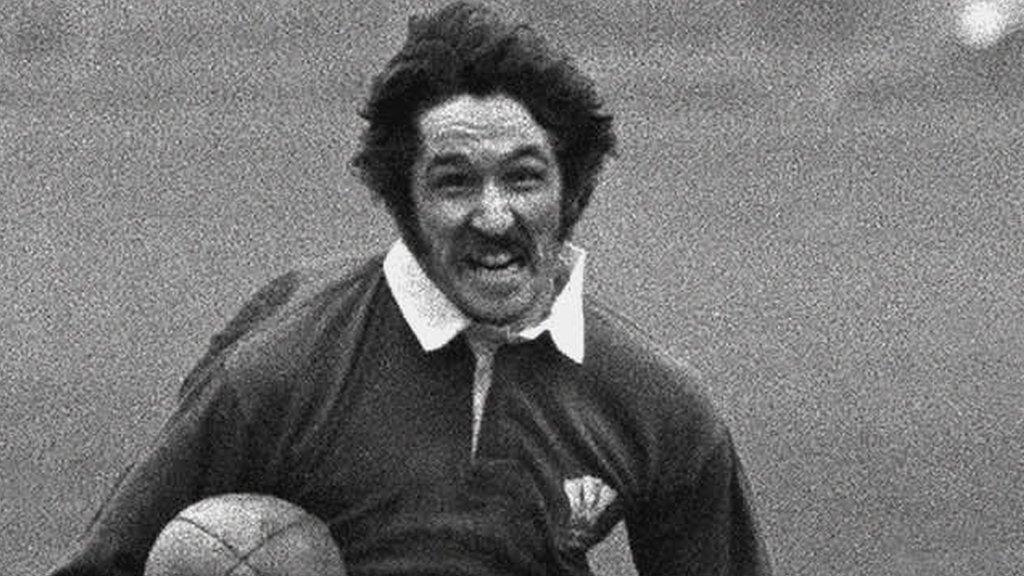Six Nations: Relive six memorable Wales v Ireland encounters
- Published
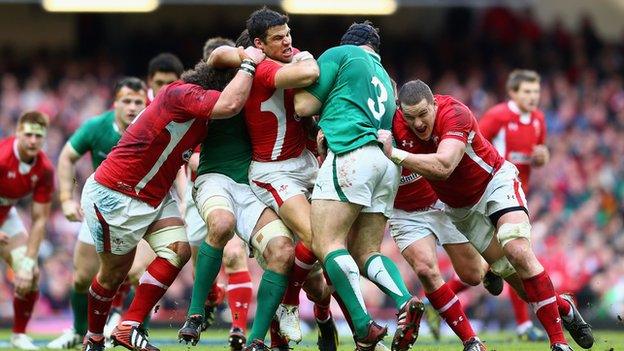
Wales v Ireland encounters in the Six Nations are fast, furious and fiercely contested
Six Nations 2015: Wales v Ireland |
|---|
Venue: Millennium Stadium, Cardiff Date: 14 March, 2015 Kick-off: 14:30 GMT |
Coverage: Live on BBC One, HD, Red Button, S4C, BBC Radio Wales, BBC Radio Cymru, Radio 5 live, 5 live sports extra, online, mobile, the BBC Sport app and Connected TV. |
It promises to be another epic Six Nations encounter on Saturday as Wales seek to derail Ireland's Grand Slam bid and boost their own title claims.
BBC Wales Sport delves through the video archives to pick out some truly memorable moments from previous encounters.
Each rivalry in the Six Nations has its own particular character and history, but the one between Wales and Ireland holds a special resonance for players and supporters alike.
The records favour Wales since the two sides first met in a Home Nations match in 1882, with the men in red having won 65 of the 120 games played, Ireland taking 49, with six draws.
But since 2000 when Italy joined the party to create the Six Nations, Ireland have held the whip hand and Wales have won just five of their 15 meetings - their worst record against any team in the Six Nations.
Along the way there have been sparkling tries, dramatic endings, controversial decisions and sublime skill.
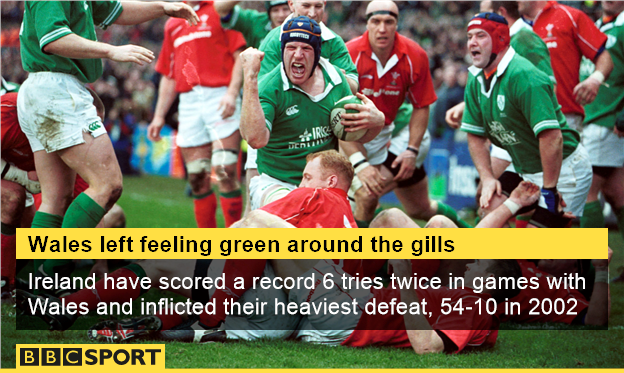
22 March 2003: Wales 24-25 Ireland
Wales came into the match in some disarray after beginning their campaign with a first defeat in their history against Italy, then losing the next two games to England and Scotland.
The home side enjoyed early success in Cardiff with Stephen Jones and Martyn Williams crossing for Wales tries.
Six Nations Wales v Ireland classics: Ronan O'Gara 2003
But two tries from flanker Keith Gleeson and a steady stream of penalties from David Humphreys put Ireland into a 22-14 lead.
With time running out Gareth Thomas crashed over and Jones' conversion brought Wales to within a point.
Wales piled on the pressure and although Jones missed a penalty, he looked to have snatched a famous victory in the final minute, the fly-half sitting back 'in the pocket' to snap a drop-goal between the posts.
But there were still two minutes of injury time remaining, enough time for Ireland to regain possession and work Ronan O'Gara into position to send a drop-goal of his own between the posts.
Welsh ecstasy turned to despair, Irish resignation to triumphant celebration in one of the most thrilling finishes to a match between the two sides.
19 March 2005: Wales 32-20 Ireland
Wales had not beaten Ireland in Cardiff since 1983 and not won a Grand Slam since 1978, but both were there for the taking in the final round of the 2005 Championship.
O'Gara put the visitors ahead with a penalty, but Gavin Henson replied with a drop-goal to level the scores.
Wales v Ireland classics: Gethin Jenkins 2005
Wales were still struggling with some understandable nerves though and it took a fine piece of opportunism by Gethin Jenkins to put them on the front foot.
With 16 minutes on the clock O'Gara took too long with a clearing kick, allowing the Wales loose-head prop to loom over him and bat the ball to the ground.
Jenkins raced after the loose ball and showed some neat footwork to dribble ahead, gather and plunge over the try line.
Stephen Jones and Henson put the boot into Ireland to extend Wales' advantage to 22-6 after 58 minutes, before Ireland started to rouse themselves.
The home side needed one more score to put themselves out of reach and claim the coveted Grand Slam that had eluded them for more than a quarter of a century.
Wales v Ireland classics: Kevin Morgan 2005
Flanker Martyn Williams tidied up from a scrappy line-out with a dive pass worthy of any scrum-half, finding Jones at stand-off.
Tom Shanklin had loitered deep in the backfield and now picked his moment to surge forward, taking the popped pass and finding a brilliant line that scythed through the Ireland midfield defence.
The centre angled slightly to the right, dragging the Irish cover with him before shipping the ball back against the grain for full-back Kevin Morgan to provide the coup de grace.
Ireland did hit back to score two tries through Marcus Horan and Geordan Murphy, but Wales were too far ahead on the scoreboard and saw out the remaining minutes to claim the Grand Slam.
21 March 2009: Wales 15-17 Ireland
Cardiff was the final hurdle for Ireland to overcome in their bid to claim just the second Grand Slam in their history - 61 years after their first.
Six Nations Wales v Ireland classics: Ireland's Grand Slam 2009
Wales kept Ireland scoreless in a nervy first half in which defences were well on top and led 6-0 at half-time through two Stephen Jones penalties.
But Ireland came out of the dressing-room revitalised for the second period and were soon on the scoreboard as Brian O'Driscoll finished off a series of close-range drives.
With their tails up Ireland soon claimed a second try, as Tommy Bowe plucked O'Gara's chip out of the air and raced away to the line.
Two more Jones penalties and a drop-goal by the fly-half nudged Wales in front and threatened to crush Ireland's hopes.

But in echoes of their kicking duel six years earlier, O'Gara again had the last, decisive say as he dropped a goal that would seal a glorious win for Ireland.
Jones did have one last, long-range penalty attempt that could have sent the result Wales' way, taking on the kick from almost on halfway - despite having the siege-cannon boot of Gavin Henson available - but watched it drop agonisingly short.
Irish hearts had been in their mouths as the ball sailed towards the uprights, but Irish hands were thrown into the air in delight moments later as the tumbling oval object of their attention stuttered, dipped and fell short.
12 March 2011: Wales 19-13 Ireland
This game was decided in Wales' favour by a hugely controversial Mike Phillips try early in the second half.
Jonathan Sexton had not long come on for Ireland at fly-half in place of O'Gara when he overcooked a kick and sent it into touch on the full.
Matthew Rees took a quick throw to Phillips, allowing the scrum-half to streak away down the left touchline to score.
Six Nations Wales v Ireland classics: Mike Phillips 2011
TV replays showed that Rees had used a different ball - handed to him by a ball-boy - to the one that Sexton had sliced into touch, which is against rugby's Law 19.2 (d) and meant the hooker could not take the quick line-out.
But when referee Jonathan Kaplan asked his Scottish touch judge Peter Allan 'Is it the correct ball?', Allan answered in the affirmative and Kaplan awarded the try, infuriating the Irish.
With Ireland having already lost to France, defeat in Cardiff ended their Championship hopes, although they would deny England the Grand Slam - if not the title - in the final round in Dublin.
Wales would go to Paris with a sniff of the title but found France in no mood to do them any favours, a 28-9 defeat leaving them fourth in the final table.
5 February 2012: Ireland 21-23 Wales
Wales began the 2012 Six Nations with the hugely difficult task of a trip to face Ireland in Dublin.
Jonathan Davies gave Wales an early advantage when he was on hand to finish off a move in the left corner after Rhys Priestland worked space for his centre.
But Ireland responded to inch ahead through Rory Best's try and the kicking of Jonathan Sexton.
Wales v Ireland classics: Jonathan Davies 2012
Wales retaliated with the try of the match as they worked a backs move off a throw to Justin Tipuric at the back of a line-out.
The Wales half-backs combined to pick out George North, coming off his berth on the left wing to thump between the Irish centres.
As the defenders converged on him, North flicked the ball out of the back of his hand to Davies, whose pace was more than enough to take him the rest of the way to the line through the cover.
The thrills continued and it took a late North try and an even later penalty from Leigh Halfpenny to condemn Ireland to their first defeat in the opening game of the Championship for eight years.
2 February 2013: Wales 22-30 Ireland
Simon Zebo was the stand-out performer for Ireland in another enthralling encounter in Cardiff.
The wing claimed the visitors' opening try as he showed his finishing skills to round off a typically brilliant half-break by Brian O'Driscoll.
Six Nations Wales v Ireland classics: Simon Zebo 2013
But Zebo's stand-out moment was still to come when he produced an outrageous piece of skill that would ultimately lead to another score for Cian Healy.
A promising attack seemed about to founder as a misplaced pass went behind Zebo, but despite being at full pelt the wing got his heel to the ball to pop it back into his arms and carry on the move.
O'Driscoll added a third try to give Ireland a 23-3 half-time lead and although Wales also crossed the line three themselves - via Alex Cuthbert, Leigh Halfpenny and Craig Mitchell - in a stirring second-half fightback, the kicking of fly-half Johnny Sexton gave Ireland a winning edge.
- Published6 February 2014
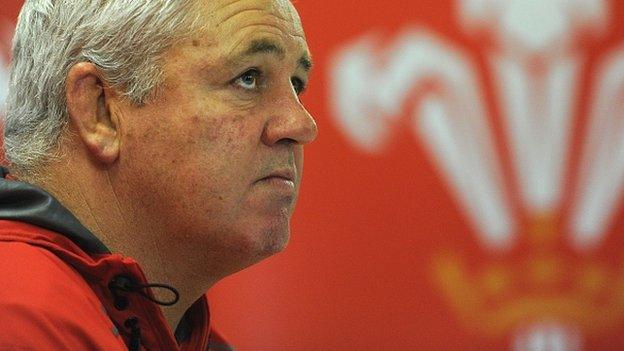
- Published11 March 2015
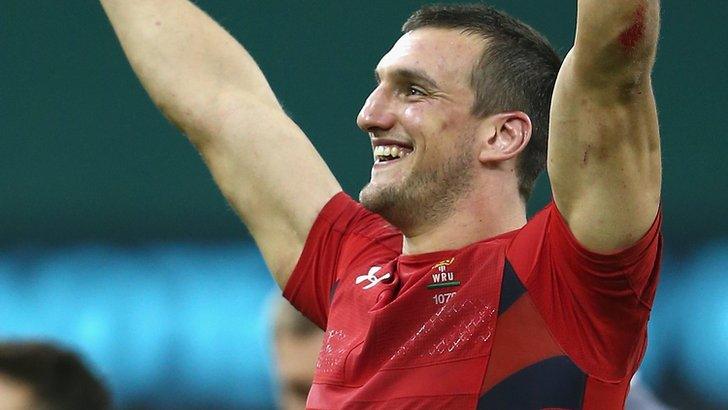
- Published11 March 2015
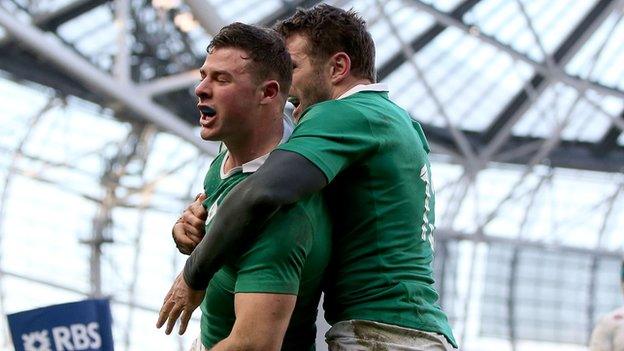
- Published14 September 2016

- Published25 August 2011
